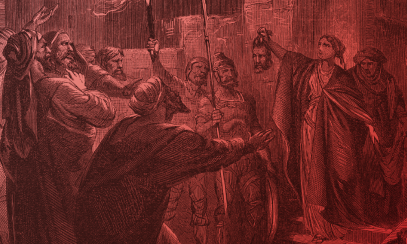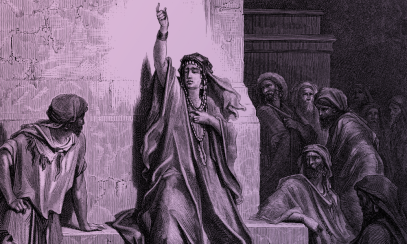
The Third Commandment: Remember the Sabbath Day, to Keep It Holy
I have set before you life and death, the blessing and the curse. Choose life, then, that you and your descendants may live, by loving the Lord, your God, heeding his voice, and holding fast to him.”(Dt 30: 19-20)
The gift of the Ten Commandments “is the gift of God himself and his holy will.” Specifically, the “10 words” are the words of God that “point out the conditions of a life freed from the slavery of sin.” They show us a path of life that sums up and proclaims God’s law and will “make explicit the response of love that man is called to give to his God.”
THE THIRD GIFT: Remember the Sabbath day, to keep it holy.
The “third word” refers to the gift of God making the Sabbath holy. The first creation story of the Book of Genesis recounts God’s creation of the world. It explains how, on each of six days, God brought forth another aspect of the created order until the world was complete. God then rested from his work on the seventh day, blessing it and making it holy.
The beauty of the Sabbath lies precisely in the fact that the source of its holiness is God, not us. It is set apart by God for God and is thus goodness itself, so we can then trust fully in its sanctity.
Further, because God is the source, this gift is about love. And it is in this love that the true richness of the commandment comes to the fore. For example, in Exodus 20:10, God explains to Moses his view of what it means to fulfill this commandment: “You shall not do any work, either you, your son or your daughter, your male or female slave, your work animal, or the resident alien within your gates.”
In other words, all are to partake of the goodness and abundance of the Lord on his day. All creation belongs to God, not us, and therefore is sacred, made holy by God just like the Sabbath. It follows, then, that no one would be excluded from the rest and benefits of this day.
The proper response
Since the essence of the commandment is that God rested from his work on the seventh day and made it holy, a proper response to this gift is simply to do the same. The Catechism teaches that the Sabbath was entrusted to Israel to keep “as a sign of the irrevocable covenant.” It was a day set apart not only for rest from work, but also for the praise of God in thanksgiving for the gift of creation and his saving actions on behalf of Israel.
For Catholics, the Sabbath, along with the totality of the Law, prefigures and prepares for the Christ event, which fulfills the Sabbath and the Law. The Gospels all recount that Jesus rose from the dead on the first day of the week. “Because it is the ‘eighth day’ following the Sabbath, it symbolizes the new creation ushered in by Christ’s resurrection. For Christians, it has become the first of all days, the first of all feasts, the Lord’s Day – Sunday.”
The celebration of Sunday, then, fulfills not only the moral command inscribed by nature in our hearts to worship God, but also the moral command of the Old Covenant, “taking up its rhythm and spirit in the weekly celebration of the Creator and Redeemer of his people.” This, of course, occurs in the Sunday Eucharist, which “is the foundation and confirmation of all Christian practice.”
The way of life
The Third Commandment teaches us that the way of life demands the celebration of the Lord’s Day. “Sunday is the day on which the paschal mystery is celebrated ... and is to be observed as the foremost holy day of obligation in the universal Church.”
In addition, everyone should enjoy “adequate rest and leisure to cultivate their familial, cultural, social, and religious lives.” This means refraining from work or activities that “hinder the worship owed to God.”
In the Gospels, Jesus actually was accused of breaking this commandment on a couple of occasions. One such incident is related in Matthew 12:1-8 (see also Mark 2:23-28 and Luke 6:1-5). The passage tells us about Jesus responding to the protests of the Pharisees against his disciples for pulling off heads of grain to eat as they walked through a field on the Sabbath. Jesus reminds the Pharisees that King David’s men had once eaten the holy bread, normally reserved for the priest, and that the Law allowed priests on Temple duty to break the Sabbath rest without guilt.
Jesus then says something of utmost importance: “I say to you, something greater than the Temple is here. If you knew what this meant, ‘I desire mercy, not sacrifice’ (a reference to Hosea 6:6), you would not have condemned these innocent men. For the Son of Man is Lord of the Sabbath.” Now, Mark’s version (2:27) of the incident includes another statement by Jesus right before the last sentence above that goes straight to the heart of the matter: “The Sabbath was made for man, not man for the Sabbath.”
Jesus’ response affirms that God is the sole source of the holiness of the Sabbath and that God’s intention for all creation is for it to share in his goodness and mercy. In the story of what immediately followed this encounter with the Pharisees over the grain, Matthew 12:9–13 (see also Mark 3:1–6, Luke 6:6–11, and John 5:1–8) tells us that Jesus is questioned upon his entrance into the synagogue as to the legality of curing someone on the Sabbath (other passages put the question in Jesus’ mouth). Jesus ultimately gives us the definitive answer and reveals to us the will of God on the matter: “Clearly, good deeds may be performed on the Sabbath.”
Put another way, goodness and mercy shall flower even on the Sabbath, for it was God’s goodness and mercy that created the Sabbath. The Sabbath was created so that we might participate in the life of God, who is Good itself and therefore our greatest good. This is to say the Sabbath was created so that we might have life and have it more fully, which is the very aim of any true act of mercy. Consequently, works of mercy also constitute appropriate activities on the Lord’s Day.
Quotes are from the Catechism of the Catholic Church (2168–2195).
Doug Culp is the CAO and secretary for pastoral life for the Diocese of Lexington, Ky. He holds an MA in theology from Catholic Theological Union in Chicago.



